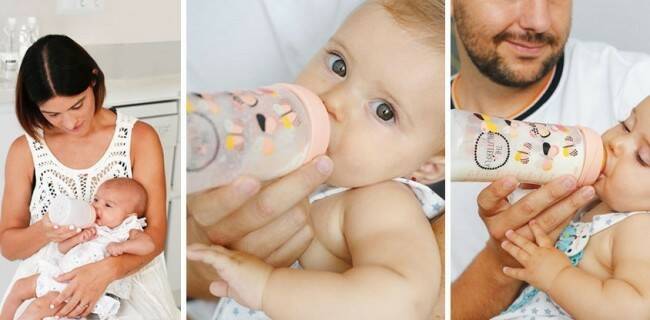
Most moms you will meet during your pregnancy will be very supportive of breastfeeding.
They will therefore always recommend that you start breastfeeding.
As long as you support your choice, you have the greatest chance of success.
If you (for whatever reason) do not want to breastfeed but bottle-feed,
then everyone will (have to) respect your choice.


Breast feeding
Benefits of breastfeeding
- Mother's milk is rich in antibodies.
- These antibodies provide protection that makes it difficult for germs to enter the body.
- Breast children have little trouble with hard stools, even if they only come once or twice a week.
- This is due to the composition. Breast children usually have their stool several times a day. The meconium (first stool) is easily discharged, which in turn contains a lot of bilirubin, which means that breast children have less chance of jaundice.
- Certain fats in breast milk are extra useful for brain development.
- A baby derives more nutritional value from a certain amount of breast milk than from the same amount of formula based on cow's milk.
- Breast milk is low in salt, which is good for the young kidneys. • The ratio of calcium and phosphorus in breast milk is better for a baby than that in formula.
- Breastfeeding is a vigorous sucking and chewing motion for the baby. This is good for jaw development and oral motor skills.
- The effort of drinking at the breast after a saturated diet promotes good deep sleep.
- Drinking too greedily by a breast baby is not easy. Swallowing air and problems with belching are much less common than with bottle-fed children.
- Breast milk is always fresh.
- Breast milk always has the right temperature and the right composition. Breastfeeding is cheap.
- The direct, nurturing skin-to-skin contact by mother and child is experienced as valuable.
- The chance that your child will have to be hospitalized is five to seven times smaller than when you bottle-feed.
- Children who are predisposed to allergies should be breast-fed. A predisposition can never be removed, but the body's own protein in breast milk is much better tolerated than the cow's milk proteins in formula.
- Breast-fed children are less likely to develop diabetes, MS, or obesity later in adulthood.
- Women who have breastfed are less likely to develop breast cancer, ovarian cancer, osteoporosis, anemia and iron deficiency.
- Breastfeeding improves the contraction of the uterus, which speeds up recovery.
- There is less blood loss after delivery.
- Breastfeeding creates an intimate bond between mother and child.
- By (full) breastfeeding, you burn ± 500 extra calories per day and you will be back to your old weight faster.
Disadvantages of breastfeeding
- You do not know how much your child is drinking.
- You can suffer from engorgement, cracked nipples, nipple blisters and breast inflammation.
- Breastfeeding babies are less likely to sleep through the night.
- You as a mother are needed to feed your baby. Directly or with expressed milk. Your body, figuratively speaking, is not yours.
- When you suffer from gène, to any degree, breastfeeding can sometimes be a bit difficult. Women want to isolate themselves and there is not always room for that.
- When you go back to work, you have to organize more for your child's feedings. If you unexpectedly did not express enough and gave it to the daycare center, there is no alternative available there.
- If your baby is hypersensitive to some foods, he is more likely to react to them, because he can ingest some of the substance through breastfeeding.
- There are PCBs and dioxins in breast milk. These harmful substances have the property of remaining in our fat tissue. These compounds have also been found in very low amounts in breast milk.
- Breast milk also contains less iron than formula, but if everything goes normally, your baby will receive a supply of iron at birth for six months. Mother's milk is rich in antibodies. These antibodies provide protection that makes it difficult for germs to enter the body.


Bottle feeding
Advantages of bottle feeding
- It can be given by anyone, you as a mother are in principle not necessary. Your body is yours again.
- You know exactly how much your child is receiving.
- For some women, public breastfeeding is problematic. With a bottle that will not cause any problems.
- Your child will usually sleep through faster.
- When you go to work, you have to organize less. If you have not given enough food for that day at the daycare center, they can often provide your child with reserve food. Breastfeeding cannot be replaced.
- It is available in all kinds of variants. Hypoallergenic, for hungry babies, etc.
- The disadvantages of breastfeeding are the advantages of bottle feeding.
Disadvantages of bottle feeding
- There are no antibodies in formula.
- Many of the advantages of breastfeeding can be seen as disadvantages in bottle feeding.
- Bottle feeding is quite expensive.
- You must have the opportunity to prepare and warm up bottle feeding. You also have to get up at night to make and heat the bottle first.
- Babies who are bottle-fed tend to drink more greedily and will get more air with them, which can lead to more burps and colic.
- Babies with a cow's milk protein hypersensitivity will get a lot of colic from regular formula. It usually takes a while for the parents to find out why the baby is crying so much, only then will they switch to a hypoallergenic diet.

Add comment
Comments